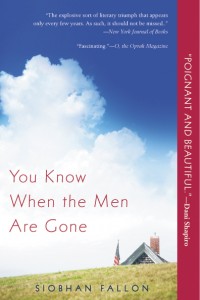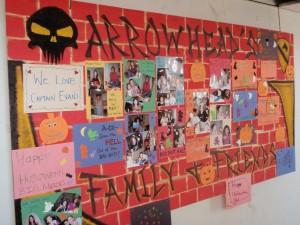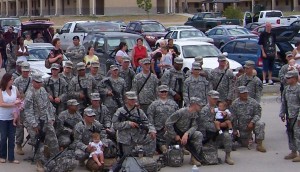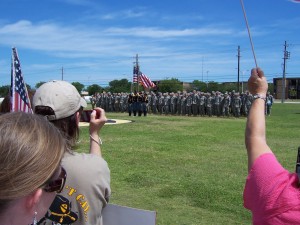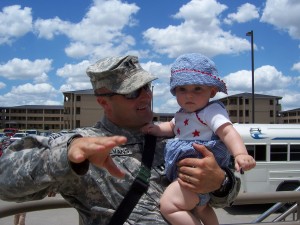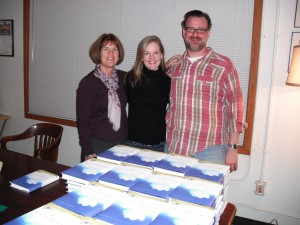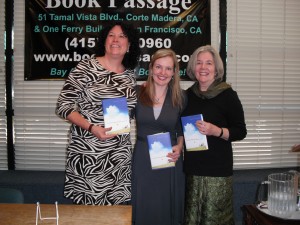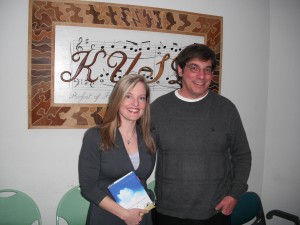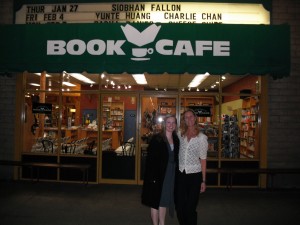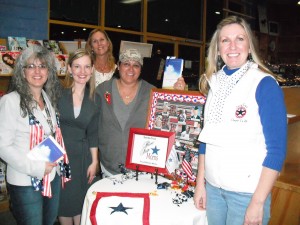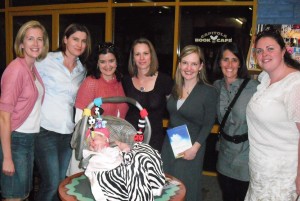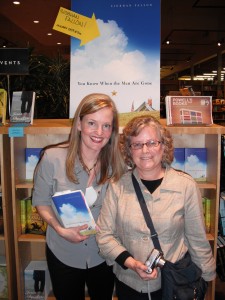The Words After War Interview with Siobhan Fallon by Michael Pitre
(This interview first ran on The Huffington Post Book Blog)
As part of Words After War’s September book club selection, Siobhan answers a few questions from Michael Pitre, author of Fives and Twenty-Fives.
Michael Pitre: You Know When the Men Are Gone was published a few months after I left the Marine Corps. My wife read it immediately, and showed me the scene from “Inside the Break” where Kailani finds a pamphlet of family reunion rules hidden among her husband’s equipment. The rules include, “Your family members are not your men; they don’t have to obey your orders,” and, “Do not engage in intercourse with your wife immediately upon your return.” My wife asked me if I remembered how many of those rules I’d broken when I came home, and we laughed because of course I’d broken all of them. So, having lived the experience, we found humor where others might’ve been dismayed. Do you think the book resonates differently with military families than with the general public? Which potential audience was more important to you when you were writing it?
Siobhan Fallon: Civilians always ask me if those pamphlets mentioned in that story are real! And of course they are, I used the one from my husband’s return from Afghanistan in 2005 as my template for the fictional version. If I remember correctly, it really did recommend, “Take time to be charming.”
There was so much I didn’t understand about the military even after I became a spouse. So yes, I hoped to show a glimpse of day to day military life to those who have never stepped inside our gates, to offer civilians more than the splashy headlines of deployments and homecomings.
As an officer’s wife, and especially as a Company Commander’s wife who led a Family Readiness Group, I was someone who was supposed to be capable and confident and I often found myself being a cheerleader. I was full of “You can do it!” or “Time will fly, before you know it your soldier will be home!” or, my least favorite, “It’s time to put on your big girl panties!” (OK, I never actually said that but I did have a magnet on my fridge that did).
None of those statements reflected the magnitude of shit spouses could go through with their mate halfway around the world when you need new tires for the car, when you, your three year old and your six month old all have strep throat and are awake at three a.m., when a tree falls on your roof during a storm, when you lost your husband’s dog, when you’re depressed and anxious and suddenly a stranger completely disconnected from your life wants to buy you a drink and that drink promises to give you a momentary escape. These are of course things that can happen to anyone, but the stress is heightened when every newspaper mentions dead soldiers in Iraq and you maybe haven’t heard from your soldier in four days, you’re in a new base far from family and friends, and on top of it all you’re thinking that to be a good wife and a patriot, you need to act like this is a breeze.
So more than thinking about ‘audience,’ I was hoping to be more authentic in my fiction than I could be as a living, speaking human being. I wrote the stories in an attempt to say yes, it’s actually OK to feel like this sometimes, the news programs are leaving so much out when they narrow military life into images of parades with heart swelling music, or even flag draped coffins. The fact that military life is so nuanced and weird, so potentially tragic as well as wonderful, is also why it’s fascinating to write about.
I was also writing while we were still there, boots on the ground, FOBs going full steam, in Iraq and Afghanistan, and seeing the evidence of that in every house or apartment in Fort Hood that was missing a spouse or parent. It was happening around me, the seemingly unending deployment cycles of deploy a year, home a year, deploy again. I didn’t have any long view or hindsight yet, I had no idea we would withdraw troops out of Iraq in December, 2011. I was busy writing the now, that small window of 2007-2009, for whomever was willing to read it.
MP: There’s a real tension between the husbands and wives in your stories. Deployed soldiers are convinced that their wives are cheating, and don’t know how to relate to their wives when they finally come home. Wives have similar suspicions of infidelity, and grow bitter while stranded in the middle-of-nowhere Texas by their husband’s profession. You walk a tightrope between these two perspectives, and both sides get an equal hearing. How did you retain your neutrality during the writing process?
SF: Well, at times it did feel like a very black and white world, women on one side, men on the other. My husband was a company commander of an infantry unit (all male) and I was the Family Readiness Group leader of all those spouses (all women). More times than I could possible count, while he was either home or deployed to Iraq, we’d have a conversation or email dialogue where each of us had to advocate for the spouse of our own gender. I’d tell him the aggrieved wife’s side of things, and he’d come back at me with the soldier’s side. I’d like to think that some of those balancing acts surfaced in my stories.
MP: Speaking of tension between service members and spouses, I’m sure you’ve seen the bumper sticker around military installations with some version of the phrase, “Soldier’s Wife: Toughest Job in the Army.” I’ve heard young service members with extremely demanding and dangerous jobs express irritation at the sight of that bumper sticker. What would be your response to a young, unattached soldier who doesn’t yet understand the burden placed on military families?
SF: I can understand how that would make a young soldier, or any soldier/airman/Marine bristle. But that’s what slogans or bumper stickers or tweets do–find a glib way to express something has a lot more depth to it than a glance allows.
A spouse appreciates a sentiment like that not because her ‘job’ boils down to being more life threatening or specialized or physically taxing than her soldier’s. But it recognizes that there’s so much more to being a spouse than cashing your soldier’s check every month: being the one who stays and waits and manages to turn whatever quarters you are assigned into a real live home, being the one who picks up that home and takes it to the next place when the military member with the functioning career is stationed somewhere new every couple of years, being the one who usually does not get the certificates and medals and plaques, being the one who is there when the movers come, who is there with the kids every day when the soldier has a two week training exercise in the field. We are called ‘dependents’ in official military speak. There are plenty of successful men and women who would gladly depend on themselves but sometimes they chose to put their military member’s employment first, sometimes the demands of being a military spouse make it very difficult to maintain a stable career of their own.
So, yes, all you EOD techs getting blown up, you guys probably win. But mil spouses like to think that the work they are doing is valid, indispensible even, and that bumper sticker acknowledges that.
MP: “Remission,” is the story of a woman dealing with a rebellious teenage daughter and a possible cancer diagnosis, all while her husband is deployed. A good friend from my time in Iraq was the daughter of a colonel who got hooked on the family business and joined the Marines. She told me a story about how when she was a little girl her father deployed to Somali while her mother was battling cancer. The tone of her story was so casual, so matter of fact. Her childhood, harrowing in retrospect, seemed ordinary to her at the time. Her dad deployed, and there was no use dwelling on it. That was his job. Military reality can be harsh, but I’ve found very little bitterness among military families I’ve known. Why do you think military families are so loyal to the service? And what would you think if one of your children wanted to join the military?
SF: Military life takes a certain type of person, and well, I like that person. Obviously no stereotype is true of all people, but I usually feel comfortable with military spouses or members of the military, we ‘get’ each other on a different level, we have touchstones we can rely on, like comparing the bases/states/countries we’ve lived in or figuring out whose baby learned to talk or walk or read while their daddy/mother was deployed. The military community is made up of hardy folk; they can hold usually their liquor and are pretty proficient at profanity and gallows humor. But most of all there’s a sense of having lived through a very specific sort of fringe lifestyle, especially since September 11, and even if you’ve never met that person before you feel like you have shared something.
Do I want my two girls to join the military? I don’t know. I was there the day my husband graduated Ranger school. He had foot rot, could hardly look me in the eye because he was so socially retarded from being in a pack of filthy men, he was nothing but skin and cheek bones. If a woman can do that, then hell, she’s amazing, I hope she runs for President someday. But do I want my little Maeve or littler Evelyn to lose forty pounds and get recycled if she’s gets caught digging through a trash can for dinner? Not so much. Of course that’s the extreme. And I would probably feel the same way if I had a son. Worried, because that’s what a parent is supposed to feel about everything related to their kids. But I’d also be proud to have instilled a sense of service into a child, the way I’d be if one of my daughters decided to become a police officer or fire fighter, a social worker or a teacher. There are jobs that people do that serve a higher purpose than filling up a bank account, and I’d be pleased to have a child chose a path that puts others first.
MP: What are you working on now?
SF: A novel tentatively titled: The Confusing of Languages. It’s set in Jordan during the Arab Spring, and I turn to the embassy community in much the same way I turned to the military world in You Know When the Men Are Gone. Embassy culture is naturally diplomatic: on the one hand we are expected to embody American ideals, on the other we are meant to embrace the culture we find ourselves in. My novel revolves around two American couples, especially two female Army spouses who become fast friends. One wife embraces Jordanian culture while the one remains very firmly rooted in her idea of America, and the two outlooks and behavior collide. The word collision sums what I am trying to get at, the collision of American and Middle Eastern culture, the collision of very different personalities, the collision of female friendship vs. marital love, all with the Arab Spring unraveling in the background.
*****
Words After War is a nonprofit literary organization with a mission to bring veterans and civilians together to examine war and conflict through the lens of literature.
Follow Words After War on Twitter @WordsAfterWar
Follow Siobhan Fallon on Twitter @SiobhanMF
Michael Pitre doesn’t have Twitter, but for information about him or his terrific novel, Five and Twenty Fives, look here.
